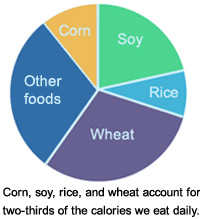Food Is Medicine: 20 Natural Painkillers in your Kitchen

In many ways, we don’t really need much advice because we already know basically what we should do:
- Eat a variety of foods, especially whole grains, fruits, and vegetables.
- Minimize candy, soda and other empty calories.
- Watch how much we eat.
- Do some physical activity every day.
As a nation, we are increasingly eating more processed foods. Our supermarkets are full of convenient packaged foods that appeal to our taste buds, but compromise our nutrition. In addition, we are eating less variety of foods. Ironically, while 17,000 new products are introduced each year, two-thirds of our calories come from just four foods: corn, soy, wheat, and rice.
Nor is our food the same as it was 20 years ago. Nutrients in the soil have been depleted, so food grown in that soil has fewer nutrients. Chemicals are increasingly used in raising both plants and animals, particularly on huge industrial farms that specialize in a few products.
It is easy to fall into the pattern of eating fast, convenient, prepared food, especially in our often frenetic lives. But we are not nurturing ourselves by doing so. Our Standard American Diet (it’s SAD, get it?) lacks nutrients and relies heavily on processed foods that include artificial color, additives, flavorings, and chemically-altered fats and sweeteners.
Our fast foods remove us from the pleasures of creating and savoring a wonderful meal, and our fast pace often prevents us from connecting over a good, slow meal. We tend to eat for convenience and speed, not health and pleasure. No wonder it’s so easy for you to overeat like a mother fucker! (Yeah, I’m talking about you. Well, there’s a very high chance I am considering 69% of Americans are either overweight or obese. 69%!!!)
So there are many reasons why we might want to pay attention to what we eat. Food is powerful stuff. Everyone has to eat. Food is not like medicine, it is medicine. We especially need to pay attention when we are sick so we can help our bodies get the nutrients we need to heal. There are many health benefits if we look at food as medicine. Here are some of the ways…

1. Make muscle pain a memory with ginger
When Danish researchers asked achy people to jazz up their diets with ginger, it eased muscle and joint pain, swelling and stiffness for up to 63 percent of them within two months. Experts credit ginger’s potent compounds called gingerols, which prevent the production of pain-triggering hormones. The study-recommended dose: Add at least 1 teaspoon of dried ginger or 2 teaspoons of chopped ginger to meals daily.
2. Cure a toothache with cloves
Got a toothache and can’t get to the dentist? Gently chewing on a clove can ease tooth pain and gum inflammation for two hours straight, say UCLA researchers. Experts point to a natural compound in cloves called eugenol, a powerful, natural anesthetic. Bonus: Sprinkling a ¼ teaspoon of ground cloves on meals daily may also protect your ticker. Scientists say this simple action helps stabilize blood sugar, plus dampen production of artery-clogging cholesterol in as little as three weeks.
3. Heal heartburn with cider vinegar
Sip 1 tablespoon of apple cider vinegar mixed with 8 ounces of water before every meal, and experts say you could shut down painful bouts of heartburn in as little as 24 hours. “Cider vinegar is rich in malic and tartaric acids, powerful digestive aids that speed the breakdown of fats and proteins so your stomach can empty quickly, before food washes up into the esophagus, triggering heartburn pain,” explains Joseph Brasco, M.D., a gastroenterologist at the Center for Colon and Digestive Diseases in Huntsville, AL.
4. Erase earaches with garlic
Painful ear infections drive millions of Americans to doctors’ offices every year. To cure one fast, just place two drops of warm garlic oil into your aching ear twice daily for five days. This simple treatment can clear up ear infections faster than prescription meds, say experts at the University of New Mexico School of Medicine. Scientists say garlic’s active ingredients (germanium, selenium, and sulfur compounds) are naturally toxic to dozens of different pain-causing bacteria. To whip up your own garlic oil gently simmer three cloves of crushed garlic in a half a cup of extra virgin olive oil for two minutes, strain, then refrigerate for up to two weeks, suggests Teresa Graedon, Ph.D., co-author of the book, Best Choices From The People’s Pharmacy. For an optimal experience, warm this mix slightly before using so the liquid will feel soothing in your ear canal.
5. Chase away joint and headache pain with cherries
Latest studies show that at least one in four women is struggling with arthritis, gout or chronic headaches. If you’re one of them, a daily bowl of cherries could ease your ache, without the stomach upset so often triggered by today’s painkillers, say researchers at East Lansing ’s Michigan State University . Their research reveals that anthocyanins, the compounds that give cherries their brilliant red color, are anti-inflammatories 10 times stronger than ibuprofen and aspirin. “Anthocyanins help shut down the powerful enzymes that kick-start tissue inflammation, so they can prevent, as well as treat, many different kinds of pain,” explains Muraleedharan Nair, Ph.D., professor of food science at Michigan State University . His advice: Enjoy 20 cherries (fresh, frozen or dried) daily, then continue until your pain disappears.
6. Fight tummy troubles with fish
Indigestion, irritable bowel syndrome, inflammatory bowel diseases…if your belly always seems to be in an uproar, try munching 18 ounces of fish weekly to ease your misery. Repeated studies show that the fatty acids in fish, called EPA and DHA, can significantly reduce intestinal inflammation, cramping and belly pain and, in some cases, provide as much relief as corticosteroids and other prescription meds. “EPA and DHA are powerful, natural, side effect-free anti-inflammatories, that can dramatically improve the function of the entire gastrointestinal tract,” explains biological chemist Barry Sears, Ph.D., president of the Inflammation Research Foundation in Marblehead , MA . For best results, look for oily fish like salmon, sardines, tuna, mackerel, trout and herring.
7. Prevent PMS with yogurt
Up to 80 percent of women will struggle with premenstrual syndrome and its uncomfortable symptoms, report Yale researchers. The reason: Their nervous systems are sensitive to the ups and downs in estrogen and progesterone that occur naturally every month. But snacking on 2 cups of yogurt a day can slash these symptoms by 48 percent, say researchers at New York ’s Columbia University . “Yogurt is rich in calcium, a mineral that naturally calms the nervous system, preventing painful symptoms even when hormones are in flux,” explains Mary Jane Minkin, M.D., a professor of gynecology at Yale University .
8. Tame chronic pain with turmeric
Studies show turmeric, a popular East Indian spice, is actually three times more effective at easing pain than aspirin, ibuprofen or naproxen, plus it can help relieve chronic pain for 50 percent of people struggling with arthritis and even fibromyalgia, according to Cornell researchers. That’s because turmeric’s active ingredient, curcumin, naturally shuts down cyclooxygenase 2, an enzyme that churns out a stream of pain-producing hormones, explains nutrition researcher Julian Whitaker, M.D. and author of the book, Reversing Diabetes. The study-recommended dose: Sprinkle 1/4 teaspoon of this spice daily onto any rice, poultry, meat or vegetable dish.
9. End endometrial pain with oats
The ticket to soothing endometriosis pain could be a daily bowl of oatmeal. Endometriosis occurs when little bits of the uterine lining detach and grow outside of the uterus. Experts say these migrating cells can turn menstruation into a misery, causing so much inflammation that they trigger severe cramping during your period, plus a heavy ache that drags on all month long. Fortunately, scientists say opting for a diet rich in oats can help reduce endometrial pain for up to 60 percent of women within six months. That’s because oats don’t contain gluten, a trouble-making protein that triggers inflammation in many women, making endometriosis difficult to bear, explains Peter Green, M.D., professor of medicine at Colombia University .
10. Soothe foot pain with salt
Experts say at least six million Americans develop painful ingrown toenails each year. But regularly soaking ingrown nails in warm salt water baths can cure these painful infections within four days, say scientists at California ’s Stanford University . The salt in the mix naturally nixes inflammation, plus it’s anti-bacterial, so it quickly destroys the germs that cause swelling and pain. Just mix 1 teaspoon of salt into each cup of water, heat to the warmest temperature that you can comfortably stand, and then soak the affected foot area for 20 minutes twice daily, until your infection subsides.
11. Prevent digestive upsets with pineapple
Got gas? One cup of fresh pineapple daily can cut painful bloating within 72 hours, say researchers at California ’s Stanford University . That’s because pineapple is naturally packed with proteolytic enzymes, digestive aids that help speed the breakdown of pain-causing proteins in the stomach and small intestine, say USDA researchers.
12. Relax painful muscles with peppermint
Suffering from tight, sore muscles? Stubborn knots can hang around for months if they aren’t properly treated, says naturopath Mark Stengler, N.D., author of the book, The Natural Physician’s Healing Therapies. His advice: Three times each week, soak in a warm tub scented with 10 drops of peppermint oil. The warm water will relax your muscles, while the peppermint oil will naturally soothe your nerves — a combo that can ease muscle cramping 25 percent more effectively than over-the-counter painkillers, and cut the frequency of future flare-ups in half, says Stengler.
13. Give your back some TLC with grapes
Got an achy back? Grapes could be the ticket to a speedy recovery. Recent studies at Ohio State University suggest eating a heaping cup of grapes daily can relax tight blood vessels, significantly improving blood flow to damaged back tissues (and often within three hours of enjoying the first bowl). That’s great news because your back’s vertebrae and shock-absorbing discs are completely dependent on nearby blood vessels to bring them healing nutrients and oxygen, so improving blood flow is essential for healing damaged back tissue, says Stengler.
14. Wash away pain injuries with water
Whether it’s your feet, your knees or your shoulders that are throbbing, experts at New York ’s Manhattan College , say you could kick-start your recovery in one week just by drinking eight 8-ounce glasses of water daily. Why? Experts say water dilutes, and then helps flush out, histamine, a pain-triggering compound produced by injured tissues. “Plus water is a key building block of the cartilage that cushions the ends of your bones, your joints’ lubricating fluid, and the soft discs in your spine,” adds Susan M. Kleiner, Ph.D., author of the book, The Good Mood Diet. “And when these tissues are well-hydrated, they can move and glide over each other without causing pain.” One caveat: Be sure to measure your drinking glasses to find out how large they really are before you start sipping, she says. Today’s juice glasses often hold more than 12 ounces, which means five servings could be enough to meet your daily goal.
15. Heal sinus problems with horseradish
Latest studies show sinusitis is the nation’s number one chronic health problem. And this condition doesn’t just spur congestion and facial pain, it also makes sufferers six times more likely to feel achy all-over. Horseradish to the rescue! According to German researchers, this eye-watering condiment naturally revs up blood flow to the sinus cavities, helping to open and drain clogged sinuses and heal sinus infections more quickly than decongestant sprays do. The study-recommended dose: One teaspoon twice daily (either on its own, or used as a sandwich or meat topping) until symptoms clear.
16. Beat bladder infections with blueberries
Eating 1 cup of blueberries daily, whether you opt for them fresh, frozen (nom nom nom) or in juice form, can cut your risk of a urinary tract infection (UTIs) by 60 percent, according to researchers at New Jersey’s Rutgers University. That’s because blueberries are loaded with tannins, plant compounds that wrap around problem-causing bacteria in the bladder, so they can’t get a toehold and create an infection, explains Amy Howell, Ph.D. a scientist at Rutgers University .
17. Heal mouth sores with honey
Dab painful canker and cold sores with unpasteurized honey four times daily until these skin woes disappear, and they’ll heal 43 percent faster than if you use a prescription cream, say researchers at the Dubai Specialized Medical Center in the United Arab Emirates . Raw honey’s natural enzymes zap inflammation, destroy invading viruses and speed the healing of damaged tissues, say the study authors.
18. Fight breast pain with flax
In one recent study, adding 3 tablespoons of ground flax to their daily diet eased breast soreness for one in three women within 12 weeks. Scientists credit flax’s phytoestrogens, natural plant compounds that prevent the estrogen spikes that can trigger breast pain. More good news: You don’t have to be a master baker to sneak this healthy seed into your diet. Just sprinkle ground flax on oatmeal, yogurt, applesauce or add it to smoothies and veggie dips.
19. Energize migraine medication with coffee
Prone to migraines? Try muscling-up your painkiller with a coffee chaser. Whatever over-the-counter pain med you prefer, researchers at the National Headache Foundation say washing it down with a strong 12- ounce cup of coffee will boost the effectiveness of your medication by 40 percent or more. Experts say caffeine stimulates the stomach lining to absorb painkillers more quickly and more effectively.
20. Tame leg cramps with tomato juice
At least one in five people regularly struggle with leg cramps. The culprit? Potassium deficiencies, which occur when this mineral is flushed out by diuretics, caffeinated beverages or heavy perspiration during exercise. But sip 10 ounces of potassium-rich tomato juice daily and you’ll not only speed your recovery, you’ll reduce your risk of painful cramp flare-ups in as little as 10 days, say UCLA researchers.






